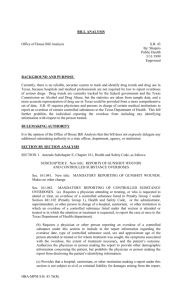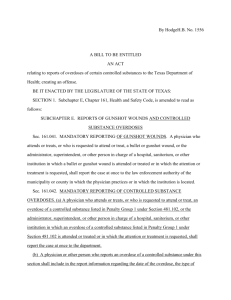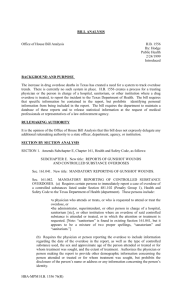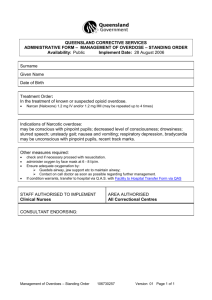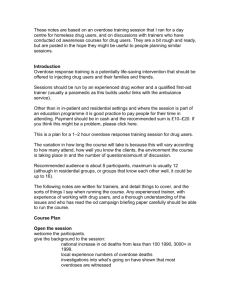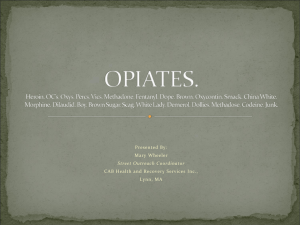BILL ANALYSIS
advertisement
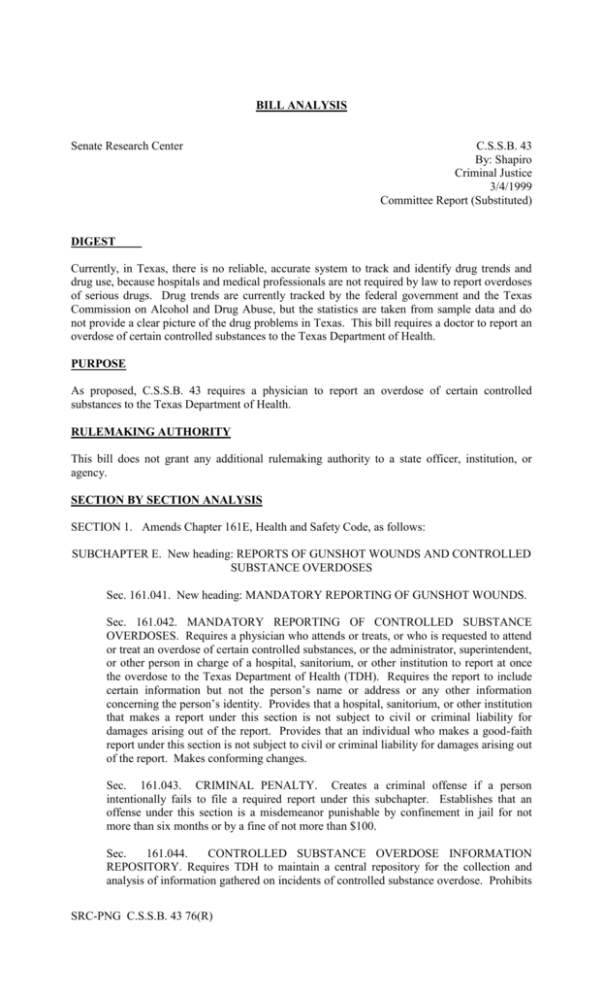
BILL ANALYSIS Senate Research Center C.S.S.B. 43 By: Shapiro Criminal Justice 3/4/1999 Committee Report (Substituted) DIGEST Currently, in Texas, there is no reliable, accurate system to track and identify drug trends and drug use, because hospitals and medical professionals are not required by law to report overdoses of serious drugs. Drug trends are currently tracked by the federal government and the Texas Commission on Alcohol and Drug Abuse, but the statistics are taken from sample data and do not provide a clear picture of the drug problems in Texas. This bill requires a doctor to report an overdose of certain controlled substances to the Texas Department of Health. PURPOSE As proposed, C.S.S.B. 43 requires a physician to report an overdose of certain controlled substances to the Texas Department of Health. RULEMAKING AUTHORITY This bill does not grant any additional rulemaking authority to a state officer, institution, or agency. SECTION BY SECTION ANALYSIS SECTION 1. Amends Chapter 161E, Health and Safety Code, as follows: SUBCHAPTER E. New heading: REPORTS OF GUNSHOT WOUNDS AND CONTROLLED SUBSTANCE OVERDOSES Sec. 161.041. New heading: MANDATORY REPORTING OF GUNSHOT WOUNDS. Sec. 161.042. MANDATORY REPORTING OF CONTROLLED SUBSTANCE OVERDOSES. Requires a physician who attends or treats, or who is requested to attend or treat an overdose of certain controlled substances, or the administrator, superintendent, or other person in charge of a hospital, sanitorium, or other institution to report at once the overdose to the Texas Department of Health (TDH). Requires the report to include certain information but not the person’s name or address or any other information concerning the person’s identity. Provides that a hospital, sanitorium, or other institution that makes a report under this section is not subject to civil or criminal liability for damages arising out of the report. Provides that an individual who makes a good-faith report under this section is not subject to civil or criminal liability for damages arising out of the report. Makes conforming changes. Sec. 161.043. CRIMINAL PENALTY. Creates a criminal offense if a person intentionally fails to file a required report under this subchapter. Establishes that an offense under this section is a misdemeanor punishable by confinement in jail for not more than six months or by a fine of not more than $100. Sec. 161.044. CONTROLLED SUBSTANCE OVERDOSE INFORMATION REPOSITORY. Requires TDH to maintain a central repository for the collection and analysis of information gathered on incidents of controlled substance overdose. Prohibits SRC-PNG C.S.S.B. 43 76(R) TDH from including in the repository any information the physician or other person is precluded from reporting under that section. Requires TDH to release statistical information from the central repository on the request of a medical professional or a representative of a law enforcement agency. SECTION 2. Effective date: September 1, 1999. SECTION 3. Emergency clause. SUMMARY OF COMMITTEE CHANGES Relating clause Amends the relating clause to provide that the bill relates to reports of overdoses of certain controlled substances to the Texas Department of Health (TDH), rather than to law enforcement authorities. SECTION 1. Incorporates certain amendments from existing SECTIONS 2 and 3 into SECTION 1. Requires a physician who attends or treats, or who is requested to attend or treat, or an administrator, superintendent, or other person in charge of a hospital, sanitorium, or other institution to report at once an overdose of certain controlled substances to TDH. Provides that a hospital, sanitorium, or other institution that makes a report under this section is not subject to civil or criminal liability for damages arising out of the report. Provides that an individual who makes a good-faith report under this section is not subject to civil or criminal liability for damages arising out of the report. Creates a criminal offense for the intentional failing to file a report under this subchapter. Deletes rulemaking authority granted to the Department of Public Safety. 2
